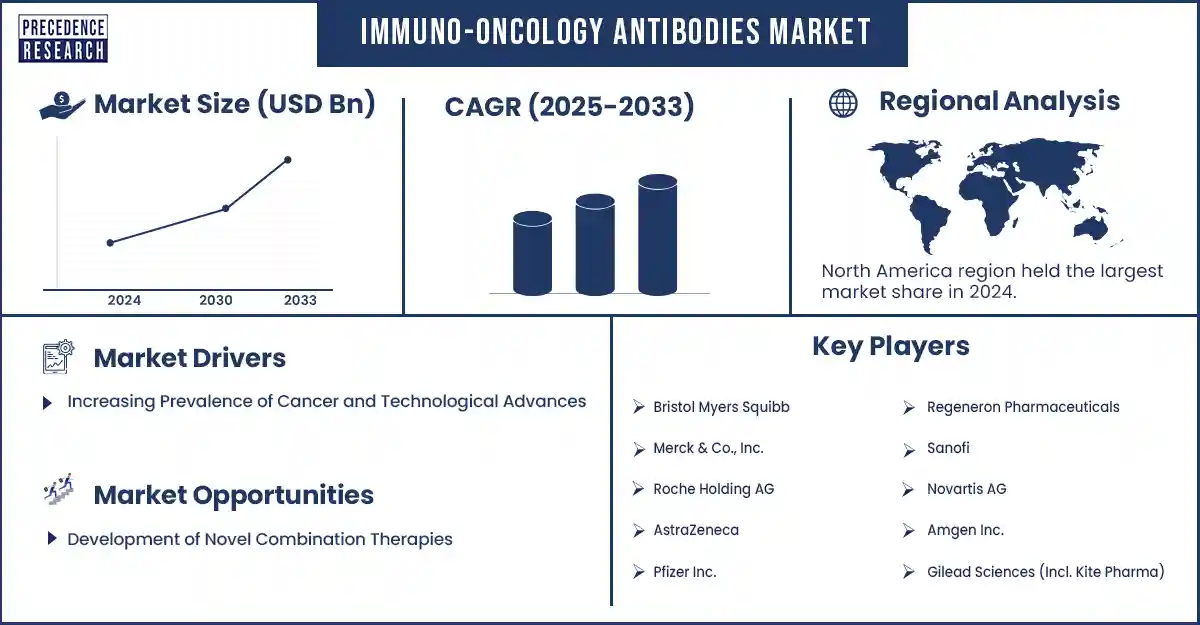Immuno-Oncology Antibodies Market Revenue and Forecast by 2033
Immuno-Oncology Antibodies Market Revenue and Trends 2025 to 2033
The immuno-oncology antibodies market is witnessing robust growth driven by rising cancer cases, advancements in biologics, and the growing adoption of targeted immunotherapies. Pharmaceutical innovation and supportive clinical outcomes are fueling market expansion. The growth of the market is attributed to the increasing cancer prevalence worldwide, growing demand for targeted therapies, and rapid advancements in antibody engineering and immunotherapy research.

What are the Key Factors Driving the Growth of the Immuno-Oncology Antibodies Market?
The immuno-oncology antibodies market is experiencing significant growth due to several factors. Firstly, the increasing number of cases of cancer worldwide. This surge in cases fuels the demand for more effective and targeted therapeutic alternatives. Secondly, advancements in biotechnology and antibody engineering facilitate the development of highly specific monoclonal antibodies, including checkpoint inhibitors, which enhance the body's immune response against tumors. Furthermore, increasing R&D investment by leading pharmaceutical companies, supportive regulatory pathways, and a rise in clinical trials open up new growth avenues for the market. The growing awareness of immunotherapy's benefits over traditional therapies, along with positive reimbursement policies and expanded indications for approved drugs, contributes to the overall market expansion.
Segment Insights
- By drug class, the checkpoint inhibitors segment continues to dominate the market because of their proven effectiveness in activating the body’s immune response against cancer, making them crucial in cancer treatments. Increasing approvals for novel inhibitors for immunotherapies further bolsters segmental growth.
- By application, the non-small cell lung cancer (NSCLC) segment dominated the market in 2024 because it is the most prevalent cancer across the world. This, in turn, boosts the demand for novel therapies, creating a need for antibodies.
- By mechanism of action, the immune checkpoint blockade segment led the market, holding the largest share in 2024. This is because of its ability to provide targeted tumor suppression and an enhanced immune response across a variety of cancers.
- By route of administration, the intravenous (IV) segment sustained dominance in the market in 2024 because of its rapid absorption, controlled dosing, and improved efficacy in delivering immunotherapies. The rising demand for targeted therapies also supports segmental growth.
- By end-user, the hospitals segment dominated the market in 2024 due to various factors. Firstly, they have advanced infrastructures for delivering treatments. Secondly, they have dedicated expertise for various cancer types, facilitating immediate intervention.
- By distribution channel, the hospital pharmacies segment dominated the market in 2024 because of the increased patient pool in hospitals. Delivering cancer treatments often require close monitoring and proper guidance, which hospital pharmacies can provide.
Regional Insights
North America dominated the global immuno-oncology antibodies market in 2024. The dominance of the region is mainly attributed to the heightened prevalence of cancer, especially in the U.S. According to the National Institutes of Health (NIH), an estimated 2,041,910 new cancer cases and 618,120 cancer deaths are projected to occur in the U.S. alone in 2025. This creates the urgent need for novel treatments, supporting market growth. Moreover, a well-established healthcare system, the presence of major market players, and regulatory pathways for novel therapies support regional market growth.
On the other hand, Asia Pacific is the fastest-growing market, driven by rising incidence of cancer, improvements in healthcare infrastructure, and government support for developing novel cancer therapies. Moreover, rising public and private investments in cancer R&D and a strong emphasis on novel drug discovery and development create opportunities in the market.
Immuno-Oncology Antibodies Market Coverage
| Report Attribute | Key Statistics |
| Quantitative Units | Revenue in USD billion/trillion, Volume in units |
| Largest Market | North America |
| Base Year | 2024 |
| Regions Covered | North America, Europe, Asia-Pacific, Latin America, and Middle East & Africa |
Recent Development
- In December 2024, the FDA approved cosibelimab-ipdl (Unloxcyt, Checkpoint Therapeutics, Inc.), a programmed death ligand-1 (PD-L1) blocking antibody, for adults with metastatic cutaneous squamous cell carcinoma (mCSCC) or locally advanced CSCC (laCSCC) who are not candidates for curative surgery or curative radiation. (Source: https://www.fda.gov)
Immuno-Oncology Antibodies Market Key Players
- Bristol Myers Squibb
- Merck & Co., Inc.
- Roche Holding AG
- AstraZeneca
- Pfizer Inc.
- Regeneron Pharmaceuticals
- Sanofi
- Novartis AG
- Amgen Inc.
- Gilead Sciences (Incl. Kite Pharma)
- Eli Lilly and Company
- BeiGene Ltd
- Innovent Biologics
- MacroGenics
- Zymeworks Inc.
- Genmab A/S
- Seagen Inc.
- I-Mab Biopharma
- Hengrui Medicine
- Alphamab Oncology
Get this report to explore global market size, share, CAGR, and trends, featuring detailed segmental analysis and an insightful competitive landscape overview @ https://www.precedenceresearch.com/sample/6513
You can place an order or ask any questions, please feel free to contact at sales@precedenceresearch.com |+1 804 441 9344